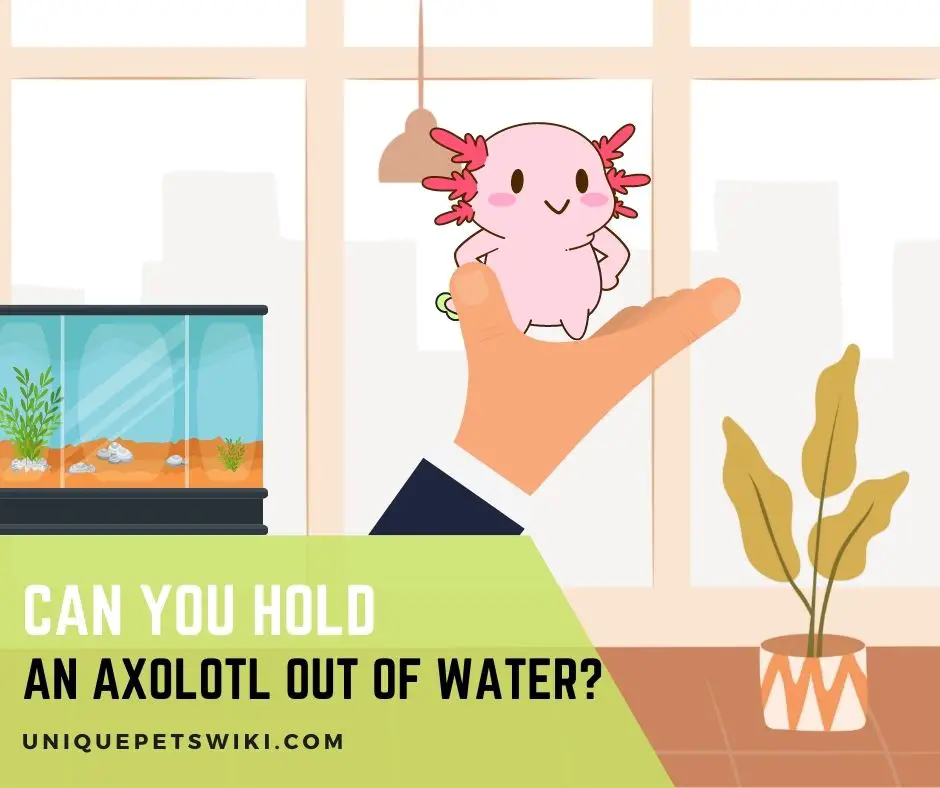An axolotl is a unique pet, and it’s entirely aquatic. It is pretty exciting to watch axolotls walk around their tank, and some will even come to greet you. During this time, the temptation to pick them up is compelling.
I know how badly you want to touch your dearly loved friend, but is it okay to have it out of water? Can you hold an axolotl out of water?
But before you decide to hold your axolotl out of water for whatever reason, read through the article to know if these pets can survive outside water.
Contents
Can You Hold an Axolotl Out of Water?
Yes, you can keep axolotls out of the water but only when necessary.
The circumstances when you can hold an axolotl out of water is when you want to transfer it to another tank to salt bath or when cleaning its tank.
Otherwise, it’s not ideal to remove these pets from water when you feel like doing so. It stresses them very much when not in contact with water or being outside the aquatic.
Before you embark on cleaning your axolotl’s tank, provide a container with water to hold the pet temporarily. It will prevent you from exposing the pet to air for too long.
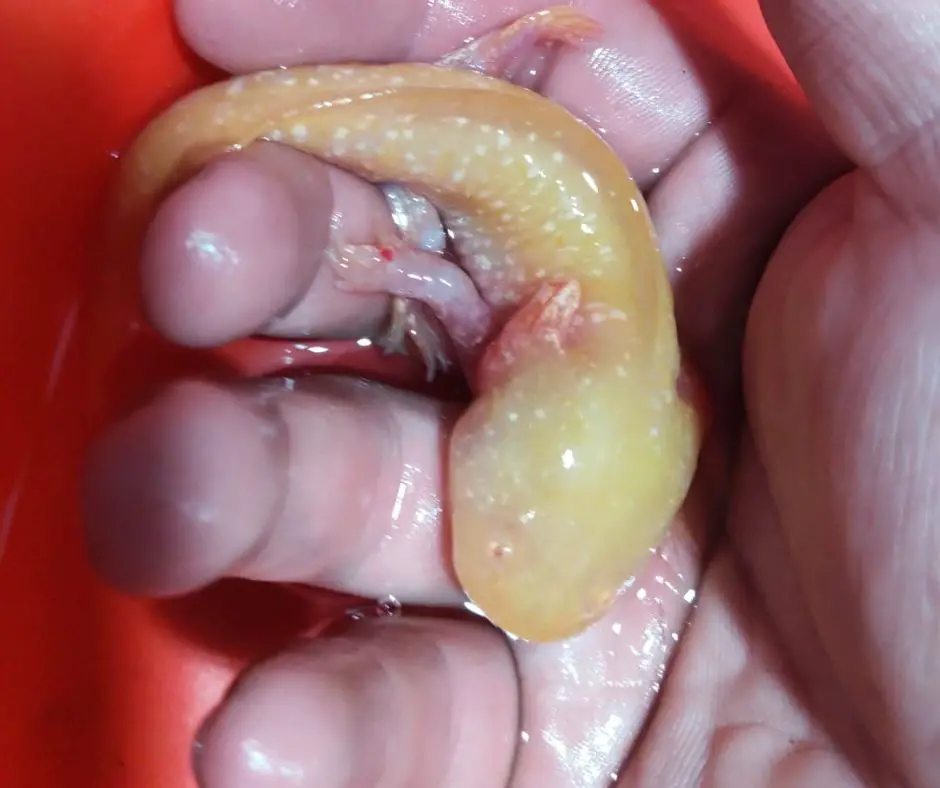
Proper Way of Holding Axolotl
If you carelessly hold your axolotl, you can end up hurting it. Cartilages make up the most significant part of an axolotl body, which explains why these aquatic creatures are delicate.
They have smooth and soft skin that is extremely sensitive. You need to be cautious when holding them.
Moreover, if you can avoid handling your axolotl frequently, the better; see how you can properly hold your axolotl below.
- It’s always necessary to clean your hands before picking up your axolotl. Make sure your hands are soap-free. Due to their sensitive skin, axolotls are susceptible to bacteria and diseases.
Axolotls have a slime coat that predominantly protects the skin from bacteria and diseases, but it doesn’t block 100% of these pathogens.
Any traces of soap or dirty hands can be dangerous to your axolotl.
- Use both hands to hold your axolotl to prevent it from slipping backward or forward, and always handle them gently. It can be a bit of exercise before you succeed in holding an axolotl from its tank, but always be calm and patient.
Don’t hurry to pick it up again if your axolotl slips out of your grasp. Allow some time for the pet to relax in the tank, and then you can pick it up.
- The right way to pick up an axolotl includes gently keeping your hands under its belly, ideally, behind its front legs and in front of the back legs. Make the grasp firm enough to prevent the axolotl from pushing itself out of your hand.
Let your grip be firm enough to prevent the axolotl from sliding out. If you’re cleaning its tank, immediately transfer the axolotl to another container.
Also read: How To Transfer Axolotl: 3 Tips to Prevent Temperature Shock
Can Axolotl Live on Land?
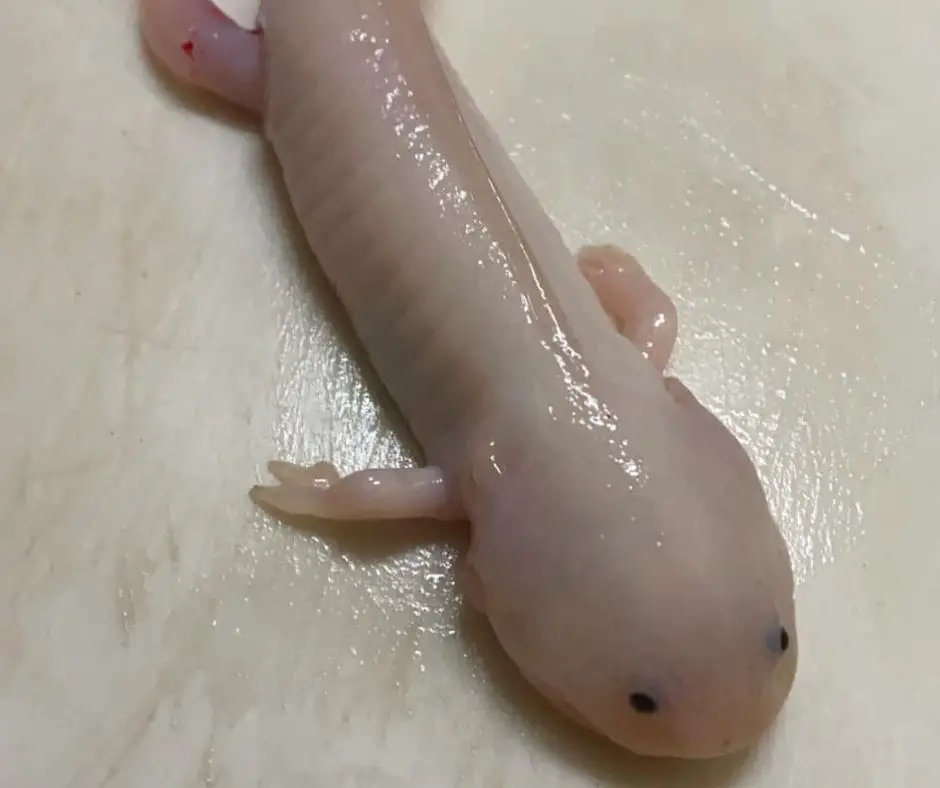
No, axolotls cannot live on land. There are no records indicating that axolotl successfully lived terrestrially.
It’s not natural for an axolotl to survive on land since they are submerged under water throughout their lives. Axolotls have a stunning array of external gills that play a fundamental role.
The gills provide room for gaseous exchange that involves expelling Co2 and inhaling oxygen, thus enhancing the survival of axolotls. That happens typically in water.
Axolotls can breathe outside of water, but their gills are more effective in the water than outside of water.
If you hold your axolotl out of the water and notice flared gills, that’s a sign that your pet is distressed.
Furthermore, an axolotl can breathe through its skin and cheeks, but all these respiration methods are potent in water.
Theoretically, axolotls can be thought to survive both on land and water due to the presence of gills and lungs.
They can breathe some air with their lungs, but their gills function better than the lungs.
Axolotls dry out very fast when outside of water, which may cause them to be too dry and eventually affect their ability to breathe.
When the gills are dry, they cannot function, and your pet will stop breathing. You gain nothing by bringing your pet out of the water, but you’re only exposing it to problems.
Also read: Can Axolotl Live Out of Water?
How Long Can You Hold an Axolotl Out of Water?
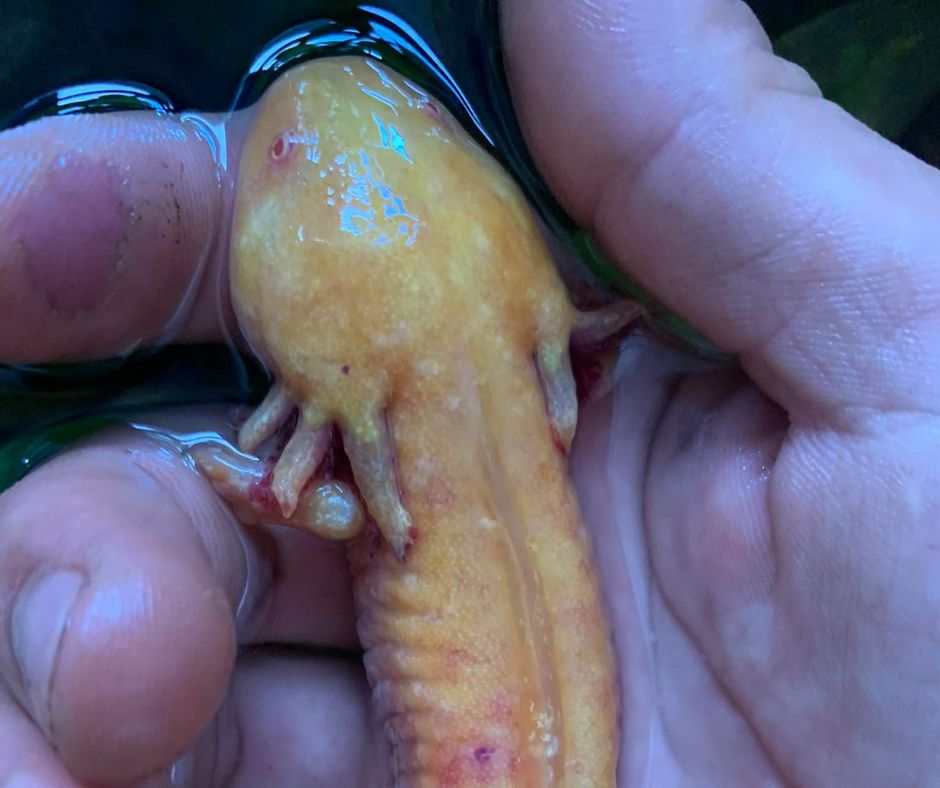
An axolotl can survive outside water for about an hour, but only if it is moist and doesn’t dry out.
In the absence of any moisture, an axolotl will not stay more than two minutes before showing signs of distress.
These amphibians will quickly run out of breath when kept out of water for an extended time and eventually die. See below why axolotls cannot thrive outside of water for a long time.
Axolotl Respiratory System
Axolotl has functional lungs, but they are rudimentary. They can remain on the land for some time as long there is oxygen in the lungs.
But immediately oxygen gets depleted, your axolotl will not survive on land anymore.
An axolotl that spends more time out of water becomes stressed; consequently, the gills flares and cannot pump oxygen into the lungs. When in such a scenario, you risk losing your pet.
Personality: Do Axolotl Like to be Held?
Furthermore, axolotls are solitary pets who like to be alone and enjoy being in a place where they can express their behavior freely, including exploring their habitat and finding new places to hide in the tank.
After learning it’s risky to have an axolotl out of the water, some caretakers take the privilege of holding their pets while inside the tank.
And this is okay. You may notice your axolotl coming to scrutinize your hand, or it will keep away.
That explains one thing, axolotls are not happy about being held. They can come and use your hand for a resting area, but they escape if you try to hold them.
Holding an axolotl is very stressful to them, which can affect their breathing behavior, especially when out of the water.
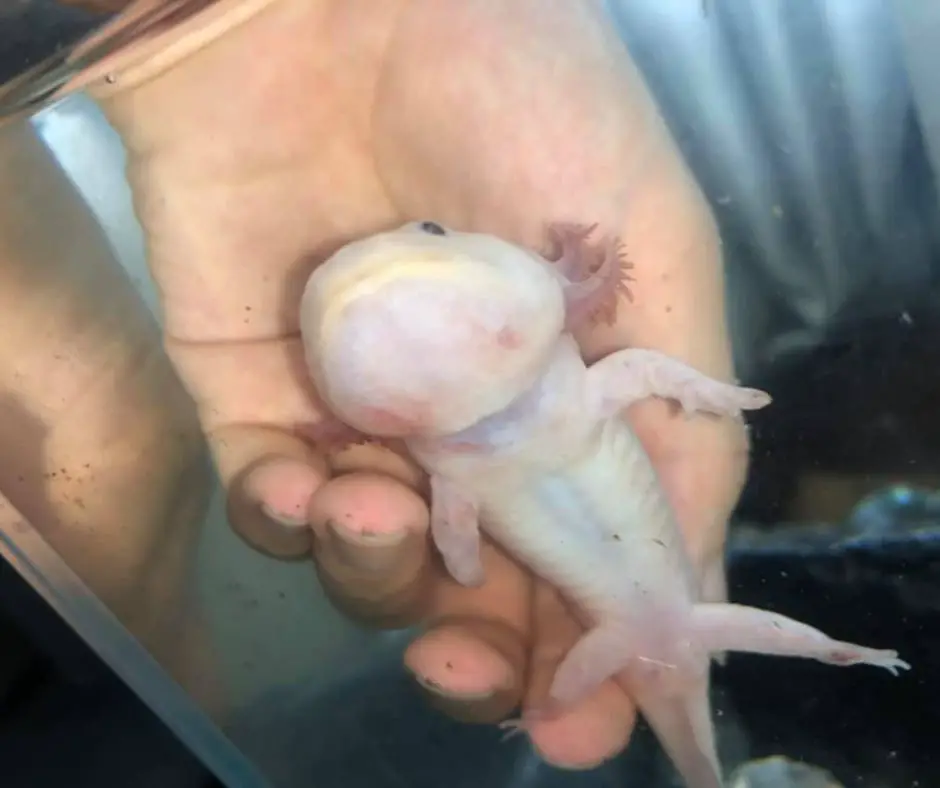
What Happens When Axolotl Is Out of Water for Too Long?
An axolotl breathing capacity can only sustain them for a limited time on land, usually not more than one hour. The moment these pets come out of the water, they struggle excessively.
The dangers of having your axolotl out of the water are many, with stress leading. Other consequences include severe dehydration, diseases, breathing troubles, damage to the limbs and organs.
Damage to their Limbs and Organs
Axolotl muscles and limbs are designed for swimming and moving around in the water. These animals can’t adapt to terrestrial life because of their aquatic features.
If an axolotl comes on land, it will have difficulty moving or walking any distance. Although axolotls can walk on water, their limbs are not strong enough to fully support their weight.
The natural buoyancy from the water assists in holding up the major part of an axolotl’s weight. A weight that the legs alone cannot support.
So then, when these creatures are struggling and attempting to move on the land, the body’s weight will exert pressure on the limbs and perhaps damage them.
In addition, your axolotl’s internal organs may crush because of the heavyweight.
Aqueon 10 Gal Black Aquarium
- High quality glass construction with clean silicone sealed edges
- For freshwater and marine applications as well as desert or tropical terrarium applications
- Tank measures 20.25" long x 10.5" wide x 12.625" high
- Always include a drip loop when plugging aquarium appliances into the electrical outlet
- Place aquarium on a stand that is able to safely bear the weight of a filled aquarium
Last update on 2022-12-30 / Affiliate links / Images from Amazon Product Advertising API
Severe Dehydration, Disease, and Breathing Troubles
Axolotls are amphibians that thrive best inside water. Keeping them moist is imperative for their survival.
The skin of these pets tends to absorb some oxygen, but this is only possible when it’s moist.
Earlier on, I mentioned that axolotls have a slime coat to help them keep safe. It helps to ward off parasites, bacteria, and dehydration.
If your pet happens to be outside water for too long and someone handles its skin, the slime coat may wear down and dry up.
Such an axolotl will eventually suffer from extreme water evaporation, leading to severe dehydration.
Likewise, the lack of slime coat makes axolotls vulnerable to developing diseases and infections that result from bacteria and virus invasion.
Bacteria and parasites can easily penetrate the skin during this time.
Stress
If you keep axolotl out of the water for an extended period, it will develop stress. When under pressure, an axolotl is unhappy and refrains from most activities.
A stressed-out axolotl usually isolates itself, and it may become extremely fearful. Stress causes these animals to refuse food or eat less and sometimes exposes them to sicknesses.
Stress brings about the danger of weakening the immune system, which can eventually cause diseases and illnesses to develop.
All these complications tell you that it’s unrewarding to have your axolotl out of water.
Allcolor Ultra Clear Rimless Aquarium Tank 2-22 gallons Low Iron Glass
- Choose high quality low iron glass, the light transmission rate is about 91% or more, different from most ordinary glass, will make the fish tank more crystal clear. The glue is made of German professional aquarium glue, which is strong and durable and will not volatilize harmful substances, which is safe for fish and other creatures in the tank.
- The low iron glass fish tank is a very simple design that combines the frameless glass together to restore the natural beauty of the creatures in the tank to the greatest extent. Such a design needs the best glass and professional glue, as well as superb processing technology to support.
- Fish tanks are like breathing ecosystems. It allows people to get rid of geographical restrictions, and enjoy the most natural ecological beauty at home.
- Allcolor aquarium has passed strict inspection before shipment, we will also check before packing. Please do not let the corners of the fish tank touch hard objects directly.
Last update on 2022-12-29 / Affiliate links / Images from Amazon Product Advertising API
Final Sentences
Axolotls are renowned pets with distinctive personalities that attract many people to own them. They make excellent pets and have a lot of things you can learn concerning them, some of them being;
- Axolotls are amphibians meant to be in the water throughout their lives. If at all possible, you shouldn’t keep your axolotl outside of water at any time.
- Axolotl does not like to be held at all. They are solitary pets that enjoy only being in the tank exploring their environments and seeking new hide-out areas.
- The natural buoyancy of water majorly supports axolotl’s body weight. Their legs cannot support much weight. And this makes it impossible or difficult for these creatures to walk on land.
- Handling an axolotl skin can make mucus coating on their skin rub off and dry up. In the absence of this coating, axolotl becomes susceptible to diseases, infections, and dehydration.
- Axolotls dry so fast when on the land, affecting their breathing capacity. They will not survive on land for too long.
